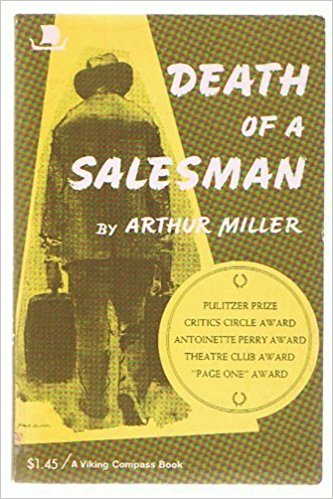

But, due to a miserable financial status, he couldn’t secure a loan for his son to start his own business. He, as a salesman, is subject to the impulses of the flea market and thinks that it is this job that can only rise him in the world of business. He craves his brother’s prosperity and endeavors for a flawless life, nonetheless, he frequently is unsuccessful to accomplish his dreams. Other than the American Dream, Willy Loman desires nothing. In Death of a Salesman, Arthur Miller reconnoiters subjects of money, death and the loss of individuality. Initially the play was titled as The inside of His Head, however, later he appears dissatisfied with the title and conferred the second title of the play i.e., Death of a Salesman. We, from the 1 st title, get a deep intuition into the psychosomatic temperament of the central character who is a salesman. Most often jovial, she has developed an iron repression of her exceptions to WILLY's behavior-she more than loves him, she admires him, as though his mercurial nature, his temper, his massive dreams and little cruelties, served her only as sharp reminders of the turbulent longings within him, longings which she shares but lacks the temperament to utter and follow to their end.Biography of William Shakespeare: William Shakespeare Biography | William Shakespeare Short Biography She gets out and puts on a robe, listening. LINDA, his wife, has stirred in her bed at the right. " He closes the door, then carries his cases out into the living-room, through the draped kitchen doorway.

A word-sigh escapes his lips-it might be " Oh, boy, oh, boy. He unlocks the door, comes into the kitchen, and thankfully lets his burden down, feeling the soreness of his palms. Even as he crosses the stage to the doorway of the house, his exhaustion is apparent.

He is past sixty years of age, dressed quietly. From the right, WILLY LOMAN, the Salesman, enters, carrying two large sample cases.

But in the scenes of the past these boundaries are broken, and characters enter or leave a room by stepping " through " a wall onto the forestage. Whenever the action is in the present the actors observe the imaginary wall-lines, entering the house only through its door at the left. This forward area serves as the back yard as well as the locale of all WILLY's imaginings and of his city scenes. Before the house lies an apron, curving beyond the forestage into the orchestra. The roof-line of the house is one-dimensional under and over it we see the apartment buildings. The entire setting is wholly or, in some places, partially transparent. (This bedroom is above the unseen living-room.) At the left a stairway curves up to it from the kitchen. Two beds are dimly seen, and at the back of the room a dormer window. Behind the kitchen, on a level raised six and a half feet, is the boys' bedroom, at present barely visible.


 0 kommentar(er)
0 kommentar(er)
